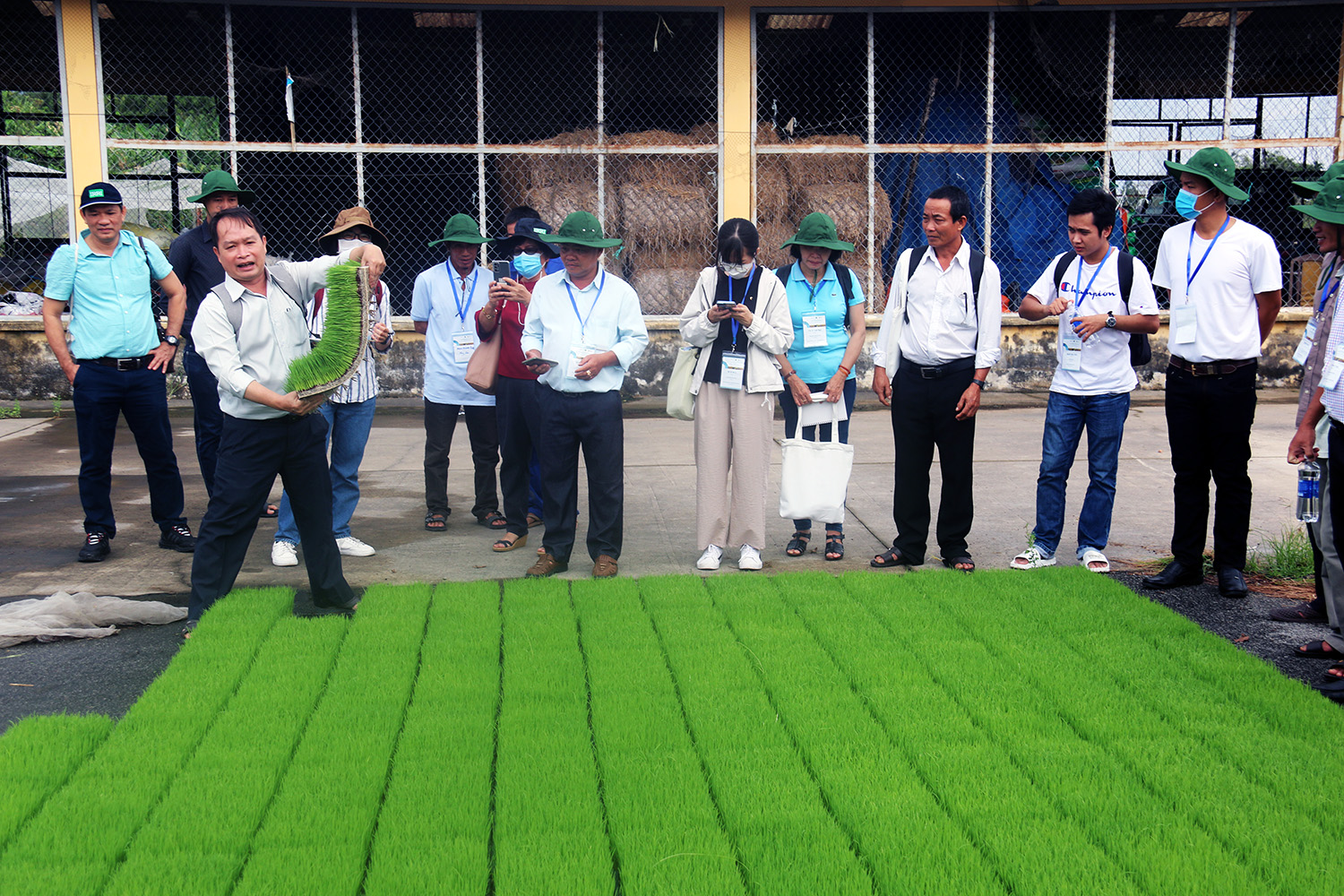Seed Equal launches in Mekong Delta with climate-resilient rice seed production workshop


Can Tho City, Vietnam ~ OneCGIAR-IRRI launched its new global initiative Seed Equal- Delivering Genetic Gains to Farmers Fields Initiative in Mekong River Delta (MRD), Vietnam. The launch commenced through the conduct of a workshop entitled “Seed Equal: Delivering Genetic Gains in Farmers’ Fields Workshop on Climate-Smart Rice Seed Production” held in Can Tho City from October 18th to 20th 2022, in partnership with the Vietnam Academy of Agriculture Sciences (VAAS) and Cuu Long Delta Rice Research Institute (CLRRI).
The objective of the workshop is to provide hands-on training and knowledge on seed production aspects of climate-resilient rice varieties. Scientists from OneCGIAR-IRRI shared their expertise and knowledge on topics such as the step-by-step climate-resilient varieties seed production process, seed system standards, water and nutrient management, mechanization and postharvest, and seed production business model development. The workshop also conducted field demonstrations and hands-on activities at CLRRI. The advanced training and knowledge on seed production of climate-resilient seed production is vital to the management of adverse impacts of climate change on seed production in the MRD, which produces over half of Vietnam’s total rice production and contributes to up to 90% of rice exports. 80% of MRD’s smallholder farmers are engaged in the rice value chain and have an average farm size of 1 hectare.

Dr. Shoba Venkatanagappa, Global Co-lead of the Seed Equal Initiative said that “rice breeding and variety development at IRRI and research organizations in Vietnam such as CLRRI are continually developing new and better climate-resilient varieties. IRRI, over the decades, is providing climate-resilient advanced pre-varieties to CLRRI and FCRI in Vietnam through its long standing rice seed sharing networks such as INGER and ASEAN RiceNet to benefit farmers in Vietnam. However, a concern is the widespread and equitable adoption of the seeds from these climate-resilient varieties. By providing seed production training in Mekong Delta, OneCGIAR-IRRI will support Vietnam to establish and enhance demand-driven local seed systems that allow these seeds to be available, accessible, and affordable to all farmers, especially smallholders thereby contribute to improved farmer livelihoods and climate change resilience, thereby increasing food and nutrition security.”
In his message during the workshop, Mr. Le Thanh Tung, Deputy Director General of the Department of Crop Production-Ministry of Agriculture and Rural Development of Vietnam, stressed that “seed security is equal to food security.” However, he said that seed development efforts in the country are fragmented and have no long term vision. With the Seed Equal Initiative, he is expecting farmers to increase their knowledge for better seed production that will improve rice quality leading to higher income, which will eventually benefit MRD and Vietnam in general.
Participants provided feedback on the training that used various hands-on and participatory approaches. Ms. Ngoc, the representative of the participating extension staff, shared that for a very short period of 3 days, she learned so much information that she can share to farmers to help them have better rice production. She was also grateful that the event became an opportunity for knowledge exchange between extension workers and farmers on important topics concerning rice production, including seed production, storage, and marketing.
Mr. Huy, the farmers’ representative, was very impressed with the training and described the experience in 3Ts — thực tế (practical), thực hành (doable), and thực hiện (applicable/scalable). He was very grateful to the organizers and expecting that similar workshops will be done again for farmers to learn and interact with experts, extension workers, and fellow farmers.

By training lead farmers and seed agronomists in MRD, it is expected that the smallholder farmers, especially women farmers who need better access to new and improved climate-resilient rice varieties, will be able to access certified seeds of newer and suitable varieties to better manage adverse impact of climate change. It is also expected that this improved access will reduce the use of old varieties with characteristics that may not meet the needs of the changing climate, as well as increase use of certified seeds with high germination rate and grain quality that can reduce yield losses and adverse impact on livelihoods. This will broadly impact food security of Vietnam and its neighbouring countries, as Vietnam is also a net exporter of rice.
As part of CGIAR’s mission to support its national partners to transform food, land, and water systems, the Seed Equal Initiative aims to support the delivery of seed of improved climate-resilient, market-preferred, and nutritious varieties of priority crops to farmers, with an emphasis on ensuring equitable access for women and other disadvantaged groups. The Initiative promotes improvement in seed systems and value chain as an effective method to distribute genetic gains for yield, reduce adverse environment stresses and pest and diseases, and support national seed systems.

Participants of the Vietnam Seed Equal workshop pose for group photos.